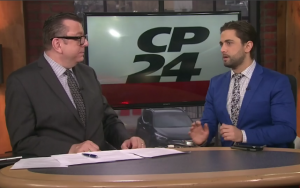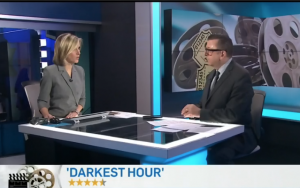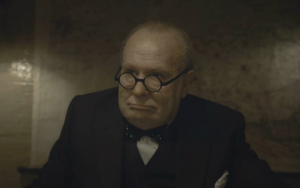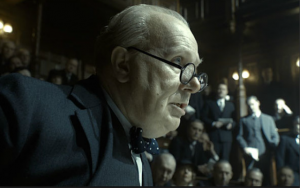RICHARD’S WEEKEND MOVIE REVIEWS FROM CP24! FRIDAY DECEMBER 08, 2017.
 Richard and CP24 anchor Jamie Gutfreund have a look at the weekend’s new movies including “Darkest Hour, “The Shape of Water” and “Wonder Wheel.”
Richard and CP24 anchor Jamie Gutfreund have a look at the weekend’s new movies including “Darkest Hour, “The Shape of Water” and “Wonder Wheel.”
Watch the whole thing HERE!
 Richard and CP24 anchor Jamie Gutfreund have a look at the weekend’s new movies including “Darkest Hour, “The Shape of Water” and “Wonder Wheel.”
Richard and CP24 anchor Jamie Gutfreund have a look at the weekend’s new movies including “Darkest Hour, “The Shape of Water” and “Wonder Wheel.”
Watch the whole thing HERE!
 Richard sits in with CTV NewsChannel anchor Marcia MacMillan to have a look at the Winston Churchill biopic “Darkest Hour, “The Shape of Water,” a movie Richard says “is the kind of movie that made me fall in love with movies in the first place,” and the not-so-wondrous “Wonder Wheel.”
Richard sits in with CTV NewsChannel anchor Marcia MacMillan to have a look at the Winston Churchill biopic “Darkest Hour, “The Shape of Water,” a movie Richard says “is the kind of movie that made me fall in love with movies in the first place,” and the not-so-wondrous “Wonder Wheel.”
Watch the whole thing HERE!
 By Richard Crouse – Metro Canada
By Richard Crouse – Metro Canada
Winston Churchill, born 143 years ago, is suddenly hot again.
“When I started work on this movie in 2016 the only Churchill I had in mind was Albert Finney’s A Gathering Storm which was brilliant,” says Darkest Hour director Joe Wright. “It had been made more than a decade ago. We weren’t aware of the Brian Cox movie, we weren’t aware of Dunkirk, The Crown hadn’t come on yet. It didn’t feel topical at all. Then suddenly the events of 2016 happened and this wave of topicality came and overcame the film.”
The fireworks in Darkest Hour begin in May 1940. It’s less than a year into the Second World War and Winston Churchill, played by Gary Oldman, is made prime minister after Neville Chamberlain lost the confidence of parliament.
He’s an unconventional choice. His own party thinks of him as a drunkard — it is said that between 1908 and 1965, he partook in 42,000 bottles of his favourite champagne Pol Roget — and members of his war cabinet favour negotiation with the Nazis over resistance and war. The so-called English Bulldog battles them and nagging self-doubt as he stays steadfast in his determination to fight the Nazis while finding an exit strategy for 300,000 British troops stranded at Dunkirk.
Wright likens Churchill’s crusade against Hitler to the resistance that has sprung up around the world in reaction to various far-right groups.
“Churchill got a lot of things wrong in his life,” Wright says, “but in this particular instance, in this context, with this enemy, he understood the perils totalitarianism and Nazism and bigotry and hate and he resisted. I think we are living in a society now that would not be the same if not for his resistance. I think that is really important to remember to fight back. To look outside of our important domestic concerns and look at our global domestic concerns.”
Darkest Hour is a historical drama with all the trappings of Masterpiece Theatre. Expect sumptuous photography, costumes and period details. What you may not expect is the light-hearted tone of much of the goings on. When Churchill becomes prime minister, his wife makes an impassioned speech about the importance of his work. He raises a glass and, cutting through the emotion of the moment, says, “Here’s to not buggering it up!” It shows a side of Churchill not often revealed in wartime biopics.
When I tell Wright I found the movie funnier than expected, he laughs. “Especially when it is called Darkest Hour.”
“I think Churchill was a very funny individual. Anyone you read who was with him, from his secretaries to his bodyguards to the politicians who were working with him, all talk about his humour. It was one of his overriding characteristics. We wanted to make sure it didn’t turn into Carry on Churchill so there were gags in there we cut.
“I think, like all of us, it was kind of a coping mechanism. The reason sex and death seem to be the main sources of humour is that they help us deal with things that might otherwise cause us anxiety. “
Wright adds that as the battle against totalitarianism unfolds the film becomes more serious. “His foe was probably the most terrifying adversary we had ever encountered, so the stakes were very high.”
 ”Atonement” director Joe Wright’s new film is a spirited—and funnier than you’d imagine—retelling of the machinations behind World War II’s Operation Dynamo. In a tour de force performance, “Darkest Hours” stars Gary Oldman as Winston Churchill in a movie that would make a great double bill with Christopher Nolan’s “Dunkirk.”
”Atonement” director Joe Wright’s new film is a spirited—and funnier than you’d imagine—retelling of the machinations behind World War II’s Operation Dynamo. In a tour de force performance, “Darkest Hours” stars Gary Oldman as Winston Churchill in a movie that would make a great double bill with Christopher Nolan’s “Dunkirk.”
The fireworks begin on May 9, 1940. It’s less than a year into the war and Prime Minister Neville Chamberlain (Ronald Pickup) has lost the confidence of parliament. His handling of the Nazi threat brought Britain into the war and, as a result, in poor health, he is forced to resign. On May 10 Winston Churchill is made Prime Minister.
He’s not exactly a man of the people. “I’ve never been on a bus,” he wheezes. “I’ve never cute for bread. I believe I can boil and egg but only because I’ve seen it done.”
He’s an unconventional choice. His own party thinks of him as a drunkard—it is said that between 1908 and 1965, he partook in 42,000 bottles of his favourite champagne Pol Roget—and members of his War Cabinet, who favour negotiation with the Nazis over resistance and war, begin plotting to remove him almost as soon as he takes power. “I’m getting a job because the ship is sinking,” he says. “It’s not a job. It’s revenge.”
In the coming days he battles politicians and nagging self-doubt as he stays steadfast in his determination to fight the Nazis while finding an exit strategy for 300,000 British troops at Dunkirk. “Nations that go down fighting rise again,” he says.
“Darkest Hours” is a historical drama with all the trappings of “Masterpiece Theatre.” You can expect photography, costumes and period details are sumptuous. What you may not expect is the light-hearted tone of much of the goings on. While this isn’t “Carry On Churchill,” it has a lighter touch that might be expected. Oldman, not an actor known for his comedic flourishes, embraces the sly humour. When Churchill becomes Prime Minister his wife, Clementine (Kristin Scott Thomas) makes an impassioned speech about the importance of the work he is about to take on. He raises a glass and, cutting through the emotion of the moment, says, “Here’s to not buggering it up!” It shows a side of Churchill not often revealed in wartime biopics.
We also see the great man in quiet moments with Clementine, the source of much of his strength. The way he is a cowed by his wife when she’s called him out for not being kind to his new secretary (Lily James)—”I want others to love and respect you the way I do.”—reveal his vulnerabilities and tenderness.
Of course the film also showcases Churchill as a tactician, an orator—“He mobilized the English language and sent it into battle,” says Lord Halifax (Stephen Dillane) after one fiery speech—and a single-minded leader who came to embody the very spirit of English defiance in the face of threats from Germany.
At the heart of the movie, and on almost every frame of film, is Oldman who hits a career high. Underneath layers of makeup and with a cigar wedged in his face, he brings history to life in a performance that goes far past impersonation. The role is a study in resistance and leadership and is sure to earn Oldman an Oscar nomination.
“Darkest Hour” director Wright brings his trademarked visual flair. During Churchill’s first BBC speech to the nation, for instance, an overhead shot of the bombing in France turns into the face of one of Hitler’s nameless victims but the movie succeeds because Oldman breathes new life into a historical figure we thought we already knew.